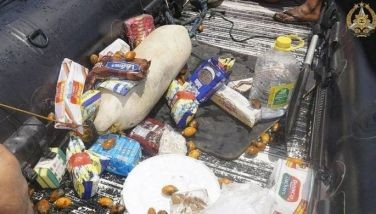Secretary of Hope
December 5, 2004 | 12:00am
 With three late season typhoons wreaking havoc over a wide swath of central Philippines and the coming holiday season bringing on its share of social welfare problems, particularly with regards to street children, Social Welfare and Development Secretary Corazon Juliana Soliman–Dinky to everyone–has more than a full plate of problems. In between meetings and on-site visits to calamity areas, STArweek managed to catch up with Secretary Dinky in her second floor office at the dswd office in Commonwealth, Quezon City.
With three late season typhoons wreaking havoc over a wide swath of central Philippines and the coming holiday season bringing on its share of social welfare problems, particularly with regards to street children, Social Welfare and Development Secretary Corazon Juliana Soliman–Dinky to everyone–has more than a full plate of problems. In between meetings and on-site visits to calamity areas, STArweek managed to catch up with Secretary Dinky in her second floor office at the dswd office in Commonwealth, Quezon City.
"It’s simply time management," says a visibly tired yet still lively Dinky Soliman, the much-admired secretary of the Department of Social Welfare and Development (dswd). "You just have to be well-organized with your schedule."
This, of course, may be easier said than done, but she manages to do just that–and today is no exception.
At the crack of dawn, Soliman was already one her way to Villamor Airbase for the trip to the Mindoros, two of the provinces devastated by typhoon Unding. Landing in Roxas, Mindoro Oriental, she met with the Disaster Coordinating Council to inspect the damage around the area. The secretary winced at the sight of shattered homes and toppled coconut trees, the exact scene repeated in Mindoro Occidental. But she soon had something to smile about, when, in the middle of her visit, she was told that hostage Angelito Nayan had finally been freed.
"I received a call from Debbie Lanvi, the coordinator of all UN Agencies here, who gave me the good news," she says cheerfully. "It was so wonderful to hear that after seeing all the destruction in Mindoro. I was, screaming my head off, ‘Thank God! Thank God!’"
Immediately following her talk with local officials about the rehabilitation plans, Soliman took a helicopter back to Manila, going straight to Pasay City for a hastily set-up press conference with the Nayan family. By 6:30 p.m., she headed back to the dswd headquarters in Quezon City to tackle office work. Caught in traffic, she used the time to prepare updates for Vice President Noli de Castro and Interior and Local Government Secretary Angelo Reyes.
"And then when I finally got here I started my executive committee meeting, which by the way, just ended before you came in," she laughs. "Yan ang araw ko ngayon!"
There is a noticeable change on the road once December comes around.Aside from increased traffic, throngs of underprivileged kids seemingly from out of nowhere flock to the jam-packed intersections of Metro Manila to "serenade" already fuming motorists with out-of-tune Christmas songs in the street version of Christmas caroling. Soliman explains the department’s program to address this problem.
"One is the Paskuhan ng Batang Pinoy. We’ve been doing that for three years and the goal is simply to discourage caroling by children to moving vehicles," she says. "But I have to be clear on that, kasi the last time I mentioned this akala nila bawal na ang mag-caroling kahit saan.
"Hindi naman ganun. Kung gagawin ’yun ng mga bata sa mga bahay-bahay, that’s fine. Pero if they’re going out pa doon sa labas, well, that’s really dangerous. How many times have you heard of a kid getting run over by a jeepney because he was playing in the street?"
A study revealed that most of the children who loiter around traffic intersections live within a five-kilometer radius from the spot. Soliman sought the help of ngos and church-based organizations to start a five-day activity in the barangays to be capped off by a big party.
"Ngayon, imbes na magkantahan kayo diyan sa kalye, dito na lang kayo," she says. "We will sing our hearts out, and we will teach you how to make little lanterns and many other fun things to do. We’ll all have a bash!"
Soliman adds that this year’s Paskuhan ng Batang Pinoy is going to be extra special because the department is teaming up with Pagcor and will be giving away great prizes to the best carolers and the best belens in the barangays.
Soliman explains that another factor contributing to the increase of people in the streets during Christmas is the seasonal migration into the city every December, particularly by indigenous peoples like the Igorots, Aetas, Mangyans and Badjaos. To address this, another project, the Pamasko para sa mga Katutubong Pinoy, was also implemented for the holidays.
"I have already directed our provincial officers in Regions III, IV and car to have the Pamasko in their respective areas for our indigenous brothers and sisters," she says, "para naman they don’t have to travel pa all the way here just to take part in the festivities, kasi meron na sila doon. I don’t know if it was noticeable last year, but there were certainly less of them in the streets."
Without question, it is Soliman’s sense and–more important–sensibility which have endeared her to the general public. She is one of the most respected and most well-liked members of the Arroyo Cabinet, and her genuine empathy for people has inspired many to believe that there really is still somebody in government who cares enough and is good enough to make a difference.
She was among the first Cabinet appointees when Gloria Macapagal Arroyo took over in January 2001, certainly a surprise appointment that had people scrambling to find out who she was. But when she was "replaced" by Vice President de Castro last May, there was such a public outcry against her unceremonious replacement that the President had to backtrack, the Vice president declined the post and the secretary with the wild streak of color in her hair stayed on.
Soliman has added to her long list of numerous contributions to civil society, effectively and without much fanfare. Along with her dswd colleagues, she developed a strong social development plan called Kapit-bisig Laban sa Kahirapan Comprehensive Integrated Delivery of Social Services, "which was built on ten years of experience before I came into the department," she explains. The program seeks to provide the most indigent families with livelihood skills and work opportunities.
The dswd has also reinstituted the Performance Management System, which keeps track of employees’ performance levels not just to ensure proper delivery of services but also to serve as a measure for advancement within the department.
"I’m very proud of my own education in terms of the bureaucracy, its strength, and the pleasant surprises that I’ve encountered working here," she reveals. "You come in kasi with a lot of negative sentiments towards government institutions, but I’m very pleased with all the learning I received seeing the strengths and qualities of civil servants."
As dswd chief, Soliman brings the heart of a long-suffering and doting mother to a department which, in contrast to other agencies, receives very little of the annual budget. And she has, in spite of these limited funds, continues to produce a whole lot.
A good example is the creation of a third Christmas program, the Bituing Pangarap ng Batang Sampa-guita, which not only connects with the objectives of her other two Pasko projects, but goes beyond the holiday season as well.
"It’s our newest mission–to get the sampaguita kids off the streets through their mothers, who are just actually there at the corners," she says. "You notice kasi na yung mga maliliit na bata ang nagtitinda while yung mga nanay nila nasa kanto-kanto lang. The reason for this is because the kids brings in a lot more money.
"I mean they’ll look up to you and say, ‘uwi na po ako’, ‘ito na lang yung tinda ko’ or ‘ito po yung pambaon ko bukas’. And how can you ever say no to that, di ba? But we have to because the more we give the more they use the children."
This project, launched just last week, is in cooperation with the Congressional Spouses Foundation Inc. and aims to upgrade the skills of the mothers and to open up markets for them which are more sustainable, like flower shops, funeral parlors and hotels, establishments that would like and use sampaguita garlands, but perhaps not the way they are currently designed and sold on the streets.
"That’s why we’re training them to learn how to make corsages or wristbands," she says. "And the great thing about this program is that it will go on for as long as there are children who need to be taken out of the streets."
While Soliman has gone about her work the past three and a half years without much publicity, she does receive her fair share of media attention. As a government bureaucrat she is almost an incongruity–sincere and hard-working, candid and unconventional, a gust of fresh air in the stuffy world of Cabinet politics.
"Maybe it’s because I have a streak in my hair," she laughs, referring to the brightly-colored wisp of hair, which, apparently, has became her trademark. "That’s already a strange thing to see. I kept it not to make headlines, but because it reminds me that I have to take everything with a grain of salt and not take myself too seriously. I think the that’s kind of impact I bring to the Cabinet–that of an activist Cabinet member. Moreover, it reminds me of where I came from, which is in development ngo work."
And she has a solid pedigree in development work. After completing her Bachelor of Science in Social Work at the University of the Philippines in 1973, Soliman busied herself in the fields of Sta.Rosa, Nueva Ecija, helping local farmers save native rice strains from extinction through a pioneering grassroots program of chemical-free cross-fertilization. It was the first inkling of her attachment for people in agriculture. In 1976, she pioneered in developing a rural organization program as a trainor and coordinator in Bukidnon under the auspices of the province’s Social Action Center.
"I’ve always had a soft spot for farmers," she says. "They have always been taken for granted, even though they’ve sacrificed a lot for the country."
In 1987, a very pregnant Soliman trooped to the Batasan Pambansa and successfully campaigned for the passage of the agrarian reform law, which resulted in uniting–at least for a time–the entire agrarian community.
In 1998, she finished her Masters in Public Administration degree at Harvard University in Boston. She has received countless awards and citations in the field of social work and community development, most notably the Ten Outstanding Women in the Nation’s Service (towns) Award in 1992 and UP’s Most Distinguished Alumnus Award.
Behind the public persona, Soliman is quite an interesting character as well, with an easy charm, quick wit, disarming sense of humor and exceptional wisdom–making you feel like you’re chatting with a favorite aunt instead of a high-profile bureaucrat who could have anything she wants at the snap of her fingers.
"Siya na yata yung taong hindi marunong magalit," says Joanne Haber, a close aid of the secretary. "I can’t even remember the last time she raised her voice to anyone here. She’s all about doing the right thing. She’s the most industrious person I know."
Executive assistant Joie Villarama shares, "I had drawn up a list of people whom I admired because they made an impact and wished one of them to be my mentor. Number one on the list was Dinky Soliman. She has dedicated her life to organizing communities, fighting for the rights of the disadvantaged and crossed over from ngo to government, bringing her special brand of joyful service... she is currently revolutionizing the department, steering it towards more people-empowering and wholistic development programs."
But does Soliman grow weary of her work at some point?
"Of course, naman! I will not be human if I didn’t have days where I just want to get away from it all," she says. "I just deal with it through meditation and prayer, or I might take-off and just remember the perks that I get out of this work."
She quickly explains: "They’re not the traditional perks of power, like getting all the attention because I’m a public figure. That’s not my cup of tea. The perks I truly enjoy are seeing the hillsides and yellow sunflowers at the Halsima Highway, talking to the midwife who decided to stay in Pinok so she can help her people instead of looking for greener pastures abroad, or the mayor of a never-heard of town in Mindanao going out of his way to serve his constituents as best he can. So when I feel exhausted and feel like crying ‘Oh my God! What am I doing here?’ I just think about those things."
Although critics say that Soliman is too idealistic in her programs to be an effective leader (her sampaguita project, for instance, was described by some as "wishful thinking"), the secretary simply shrugs this off.
"Yes, some say na hindi naman magwo-work ito kasi di naman daw naming sila mapipigilan. They’re saying that for as long as the parents don’t get enough money from our programs, they will always have their kids sell sampaguita," she says. "They could be right, but if we won’t try to do something, then there’s really nothing to hope for."
And more than the programs and projects that she sets up, hope is what Dinky Soliman wants to impart.
"When my time in the sun is over, I’d like to think that I’ve made the bureaucracy more energized and more committed to empowerment and development," she says. "But most of all, I’d just like to think that I have left a more hopeful society."
BrandSpace Articles
<
>
- Latest
- Trending
Trending
Latest
Trending
Latest
Recommended
June 3, 2024 - 6:00am
















